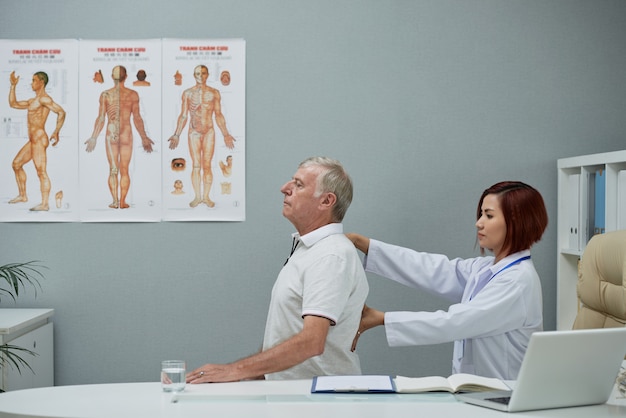
Sciatica pain is often caused by a herniated or ruptured lumbar disc. People with sciatica from a herniated disc usually feel pain in their lower back or leg. Even mild pressure on the nerves can lead to intense pain.
When pain occurs in your neck, lower back, buttocks, or thoracic spine, it might be due to sciatica. This happens when the spinal discs, which support the vertebrae in your spine, press on nerve roots, causing pain wherever that nerve travels in your body.
Sciatica is a significant health issue, causing severe pain, numbness, weakness, and tingling along the affected nerve’s path, often from the lower back down to the foot. The herniated disc puts pressure on the lumbar spine, leading to pain and numbness in the foot. The number of sciatica cases is rising, making it a serious problem that disrupts daily life. The main cause tends to be a herniated disc.
Symptoms of Sciatica from a Lumbar Herniated Disc:
– Severe pain in the lower buttock and down the leg
– Numbness along the sciatic nerve
– Weakness in areas where the sciatica nerve extends
– Tingling and burning in the lower back and legs
– Severe pain while sitting for long periods, sneezing, or moving
– Intolerable pain in the legs
– Loss of bowel or bladder control
If you experience these symptoms, seek medical help immediately to prevent the condition from worsening.
Causes of Sciatica Due to Herniated Disc:
1. **Heavy Tobacco Use:** Tobacco can damage the herniated disc, leading to sciatic nerve pain.
2. **Poor Nutrition:** Lack of proper nutrition weakens the body, making it harder to fight nerve damage, leading to severe pain.
3. **Aging:** Aging causes biochemical changes that dry out and weaken spinal discs, making them less able to handle shocks, causing sciatica.
4. **Lack of Exercise:** Regular exercise keeps the body flexible and strong, reducing the risk of sciatica.
5. **Incorrect Posture:** Poor posture puts extra pressure on the lumbar spine, weakening it and leading to sciatica.
To prevent sciatica from a herniated disc, maintain a healthy lifestyle, avoid poor posture, stop smoking, lift heavy objects correctly, and exercise regularly.
Preventing Sciatica:
– **Eat Nutritious Food:** Strengthen your bones and muscles with a healthy diet.
– **Correct Posture:** Avoid incorrect posture to prevent disc damage.
– **Avoid Tobacco:** Stop smoking to protect your discs from damage.
– **Lift Safely:** Be cautious when lifting heavy objects to avoid injury.
– **Exercise Regularly:** Keep fit to protect muscles from aging effects.
Diagnosis of Lumbar Herniated Disc:
To diagnose and treat a herniated disc correctly, it’s essential to have various tests:
– **X-rays:** To identify the cause of pain.
– **MRI or CT Scans:** To locate the exact area and extent of disc damage.
– **Myelogram Test:** Using a dye helps pinpoint the affected area during a CT scan.
Non-surgical Treatment for Lumbar Disc Herniation:
Initially, doctors may suggest non-surgical treatments like medications and therapies:
– **Cold Therapy:** Applying ice to the affected area (wrapped in cloth) to reduce pain and inflammation.
– **Medication:** Painkillers and anti-inflammatory drugs to reduce pain and swelling.
– **Heat Therapy:** Applied after 48 hours to increase blood flow and relax muscles.
– **Spinal Injections:** Steroid injections to reduce inflammation near the affected nerve.
– **Physical Therapy:** Strengthening and stretching exercises to improve flexibility and reduce pain.
Always consult a doctor before starting any treatment.
Surgical Treatment for Lumbar Disc Herniation:
If non-surgical treatments fail, surgery might be necessary. Surgery options include:
– **Laminotomy:** Removing part of the bone to reach the herniated disc.
– **Minimally Invasive Surgery:** Using advanced tools to reduce the need for large incisions.
Proper lifestyle and posture from a young age can prevent severe sciatica pain in older age. Following healthy habits can help you stay fit and avoid sciatica due to a herniated disc.